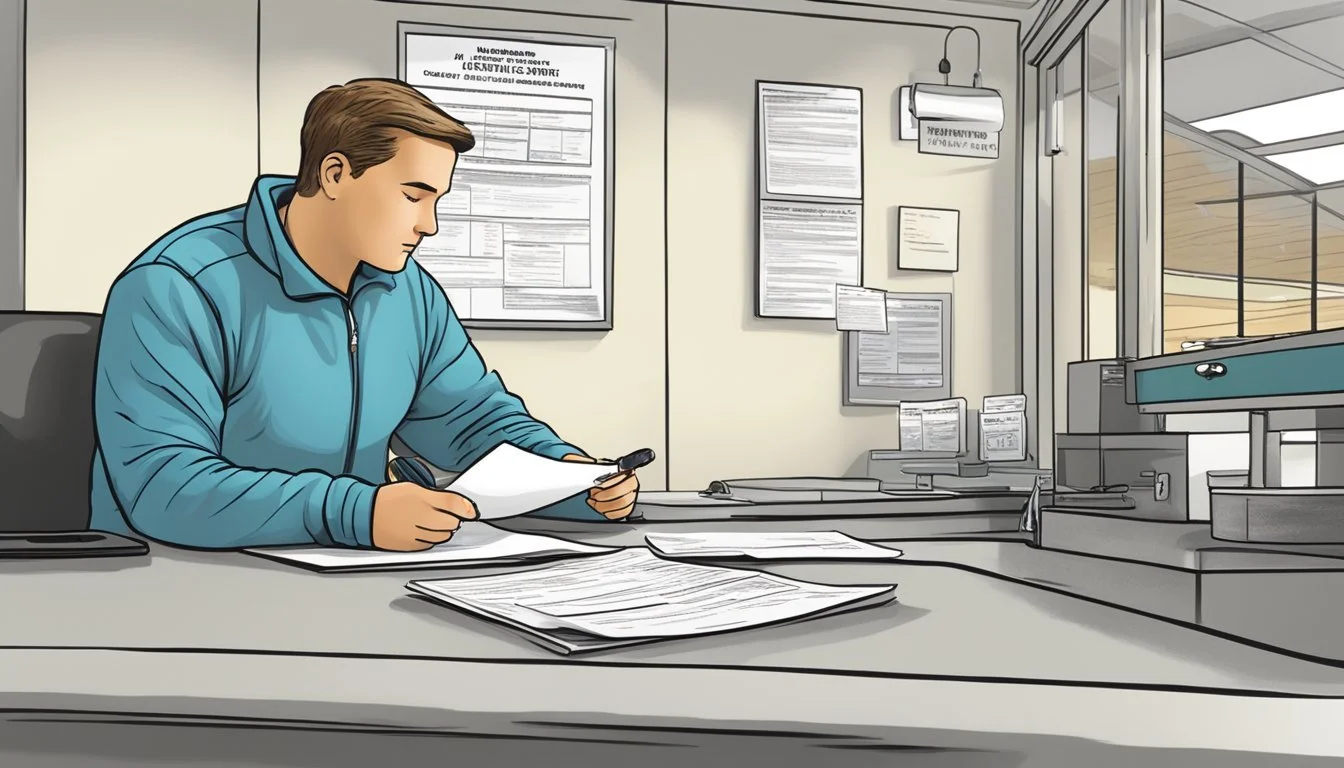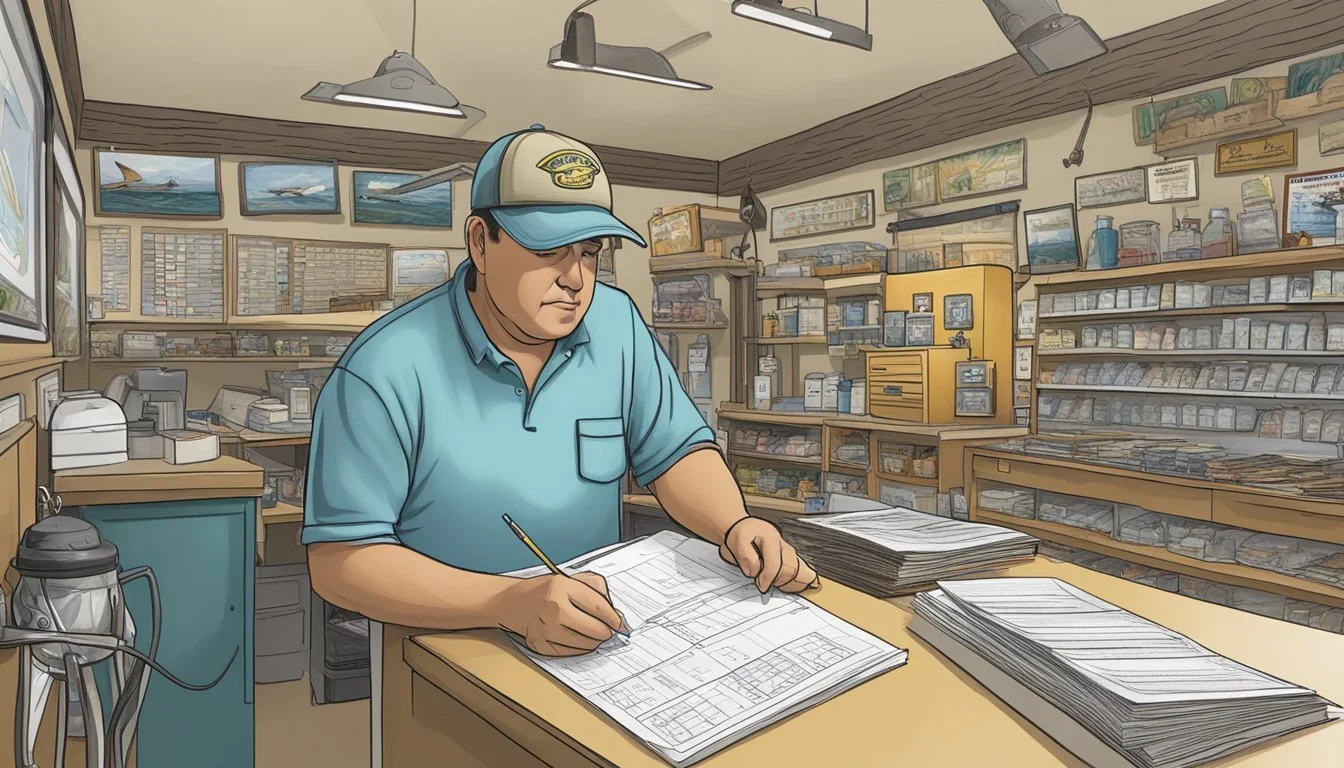How to Get a Maine Saltwater Fishing License
Your Essential Guide
Anglers looking to enjoy the pristine coastal waters of Maine will need to obtain a saltwater recreational fishing license. This license is a requirement for anyone seeking to fish in Maine's saltwater environments, including for popular species such as striped bass or bluefish. The process is straightforward and can be completed easily by both residents and visitors. Maine's Department of Inland Fisheries & Wildlife offers various license options including those for recreational lobster (What wine goes well with lobster?) and scallop fishing, ensuring that all anglers can select the license that best suits their fishing interests and plans.
The saltwater recreational fishing registry in Maine is designed to help manage and protect the state's valuable marine resources. It allows state authorities to keep track of the number of people fishing in saltwater and the types of fish being caught. Registration is necessary for most anglers over the age of 16, with specific exemptions provided under certain conditions.
To obtain a saltwater fishing license in Maine, individuals can access the Department of Inland Fisheries & Wildlife's MOSES system, which is an online hunting, fishing, and trapping licensing service. The system provides a convenient way to purchase a license from anywhere, at any time. Municipal recreational shellfish (What wine goes well with shellfish?) licenses are also available and depending on local ordinances, may be necessary for harvesting shellfish in certain towns along the Maine coast.
Understanding Maine Fishing Licenses
Maine provides a variety of fishing licenses to cater to both residents and non-residents who wish to fish in the state's inland and saltwater bodies. A proper fishing license or permit is mandatory under state regulations.
Types of Saltwater Licenses in Maine
Maine offers a Saltwater Recreational Fishing Registry for individuals interested in fishing in the state's coastal waters. This registry is vital for:
Recreational lobster fishing
Recreational scallop fishing
Municipal recreational shellfish license
Each license has specific regulations and may require different eligibility criteria for Maine residents and non-residents.
Who Needs a Fishing License?
Any person aged 16 or older who wishes to fish or transport fish from inland waters must possess a valid Maine fishing license. The details are as follows:
Maine Residents:
May exchange a 1-day or 3-day fishing license for a season fishing or combination hunting and fishing license.
The exchange requires payment of the difference between the short-term license fee and the seasonal license fee.
Non-Residents:
Required to follow the same rules and obtain a suitable license to fish in Maine waters.
Contact the Maine Department of Inland Fisheries and Wildlife for inland fishing regulations or the Department of Marine Resources for saltwater fishing details.
How to Purchase a Maine Saltwater Fishing License
To legally fish in Maine's saltwater, anglers must obtain a recreational saltwater fishing license. This section outlines the necessary steps and requirements to secure a license, available through a convenient online system or at various in-person locations.
Online Purchase Process
Individuals can buy a Maine fishing license online through the state's official service, InforME. The process is straightforward:
Navigate to the Maine Online Sportsman Electronic System (MOSES).
Register for an account or log in if already registered.
Follow the prompts to purchase the required saltwater fishing license.
Pay the fee using a credit or debit card.
Print the license immediately or save it to your device.
In-Person Purchase Locations
For those preferring a direct interaction or without internet access, licenses can be purchased in person at the following locations:
Town Clerks' offices: Available in various towns across Maine.
Licensed agents: These can include sporting goods stores or other designated establishments.
Maine Department of Inland Fisheries & Wildlife offices: The addresses can typically be found on the department's website.
Requirements for Purchase
Before purchasing a Maine saltwater fishing license, an individual must be aware of the following requirements:
Identification: A valid government-issued photo ID is necessary to confirm identity and residency.
Payment: Payment methods may vary by location, but typically include cash, check, and sometimes credit or debit cards. Online transactions require a card payment.
Information: The applicant should provide their full legal name, date of birth, and contact information. If they previously held a Maine fishing license, they should mention this as well for ease of record access.
Remember, purchasing a license not only enables one to fish legally but also contributes to the conservation and management of Maine's aquatic resources.
Costs and Fees for Licenses
The cost of obtaining a Maine saltwater fishing license varies based on residency status and the type of license. Special licenses are also available for certain groups at different fees. Understanding the specific structure of fees is essential for anglers planning to fish in Maine's saltwater environments.
Resident License Fees
Annual License:
Adult (16 and older): $1
Minor (under 16): Free
Five-Year License:
Adult (16 and older): $5
Non-Resident License Fees
Annual License:
Adult (16 and older): $15
Short-Term Licenses:
7-Day License: $10
3-Day License: Information not available from the provided data
1-Day License: Information not available from the provided data
Special Privilege Licenses and Fees
Special licenses are offered to certain individuals, which may include different fees:
Maine resident permanently stationed outside the state: Fees are unspecified, but there is likely a special consideration.
Individuals engaging in recreational lobster fishing, scallop fishing, and other shellfish: Separate licensing is required, with details and fees to be determined based on local ordinances and specific regulations.
Maine Fishing Regulations
In Maine, anglers must adhere to strict saltwater fishing regulations set by the state to ensure sustainable fishing practices and the conservation of marine life.
Saltwater Fishing Regulations
Maine operates a Saltwater Recreational Fishing Registry which anglers participating in saltwater fishing are required to join. This registry helps in managing the state's marine resources. Licenses are necessary and can vary from short-term to seasonal. The state delineates specific regulations for each fish species, which can include the allowed method of capture and fishing gear restrictions.
Protected Areas and Seasons
Some areas may be designated as protected, where fishing is either limited or prohibited to preserve the marine ecosystem. Seasonal restrictions also apply to certain species to allow for periods of spawning or recovery. Anglers should regularly check for updates on protected areas and adhere to established fishing seasons.
Catch Limits and Size Restrictions
Maine imposes catch limits and size restrictions for different species to prevent overfishing. These regulations are enforced by strict creel and size limits:
Creel (daily catch) limits: Enumerate the maximum number of fish an angler can catch and keep in one day.
Size restrictions: Specify the legal minimum or maximum size of fish that can be retained.
Anglers must always ensure they are familiar with the most current regulations regarding catch limits and size restrictions as these can change based on assessments of fish populations.
Additional Information
This section delves into specific elements related to Maine's saltwater fishing license, including the rights of Native Tribes, details on lifetime and complimentary licenses, and the rules about reporting and inspections.
Native Tribes and Fishing Rights
The State of Maine recognizes the fishing rights of Native Tribes, such as the Passamaquoddy Tribe, Penobscot Nation, Houlton Band of Maliseet Indians, and the Aroostook Band of Micmacs. Members of these tribes have certain rights and regulations pertaining to fishing that are distinct from those of non-tribal fishermen. They should consult their tribal government for specific fishing rights and license exemptions.
Lifetime Licenses and Complimentary Licenses
Maine offers Lifetime Licenses for residents, allowing them to enjoy fishing throughout their lifetime without the need to renew their license annually. There are also Complimentary Licenses available for certain qualifying individuals, such as seniors and veterans. The criteria for these licenses are specified by the Maine Department of Marine Resources.
Lifetime License: Available for purchase for different age groups
Complimentary License: May be issued to individuals who meet specific qualifications, such as age or service
Reporting and Inspection
Holders of Maine saltwater fishing licenses are subject to reporting and inspection by authorities to ensure compliance with state regulations:
Reporting: Licensees may need to report catches as part of conservation efforts.
Inspection: Fishermen can expect random inspections by officials to check for correct license and adherence to the rules.
Complying with reporting requirements and inspections is crucial in maintaining the sustainability of Maine's marine resources.
Special Licenses and Permits
Maine offers a variety of special licenses and permits to cater to different groups of anglers and hunters. These include combination licenses for those seeking to fish and hunt, discounted permits for servicemen and veterans, and specific archery permits.
Combination Licenses
Combination Fishing and Hunting: They have the option of obtaining a Combination Fishing and Hunting license, allowing them to partake in both activities throughout the season.
Combination Fishing and Archery: Anglers and hunters interested in bow hunting alongside their fishing activities can opt for the Combination Fishing and Archery license.
Serviceman and Veteran Permits
Serviceman Combination: Active duty servicemen can take advantage of the Serviceman Combination license, which provides both fishing and hunting privileges.
Serviceman Dependent: Dependents of active duty servicemen are also recognized with discounted licenses that allow them to engage in fishing and hunting.
Maine Lifetime License: Maine offers a Lifetime License for resident servicemen, which covers fishing and hunting for the entirety of the licensee's life.
Expanded Archery Permits and Licenses
Archery: Those who prefer archery can obtain the necessary Archery license that grants them the legal rights to bow hunt.
Expanded Archery Antlerless Deer Permit: For those seeking to hunt antlerless deer, Maine provides an Expanded Archery Antlerless Deer Permit. This permit is specific to designated areas and seasons.
License Management and Extras
Managing a Maine saltwater fishing license efficiently involves utilizing the state's online resources for printing and replacing licenses. One can handle their licensing needs with convenience through the MOSES system.
How to Print or Replace a License
A license holder is empowered to print a copy of their Maine saltwater fishing license whenever necessary. In the event of a lost or damaged license, they can obtain a duplicate license. To replace or reprint a license, individuals should:
Access the MOSES (Maine Online Sportsman Electronic System) website.
Log in with their credentials.
Navigate to the appropriate section for licensing management.
Follow the prompts to print or request a duplicate license.
MOSES and the Online Licensing System
MOSES serves as the cornerstone of Maine's fishing licensing management. This online system streamlines the license application process and the maintenance of licensure status, providing a user-friendly platform for anglers to:
Apply for new licenses.
Renew existing licenses.
Manage personal information.
Keep track of their licensing history.
Users need to create an account on the MOSES system, after which they can effortlessly manage their saltwater fishing licenses from the comfort of their home or office, ensuring that they remain in good standing for their recreational activities.








